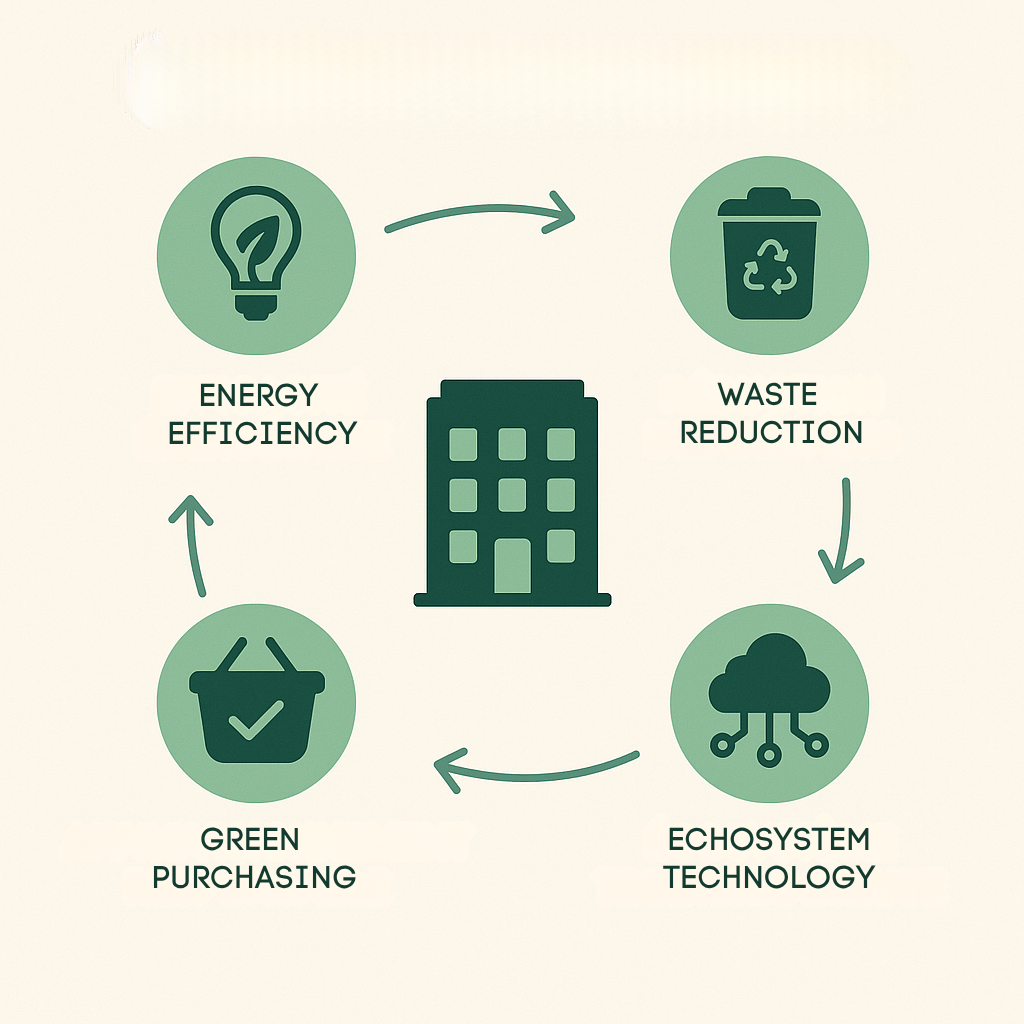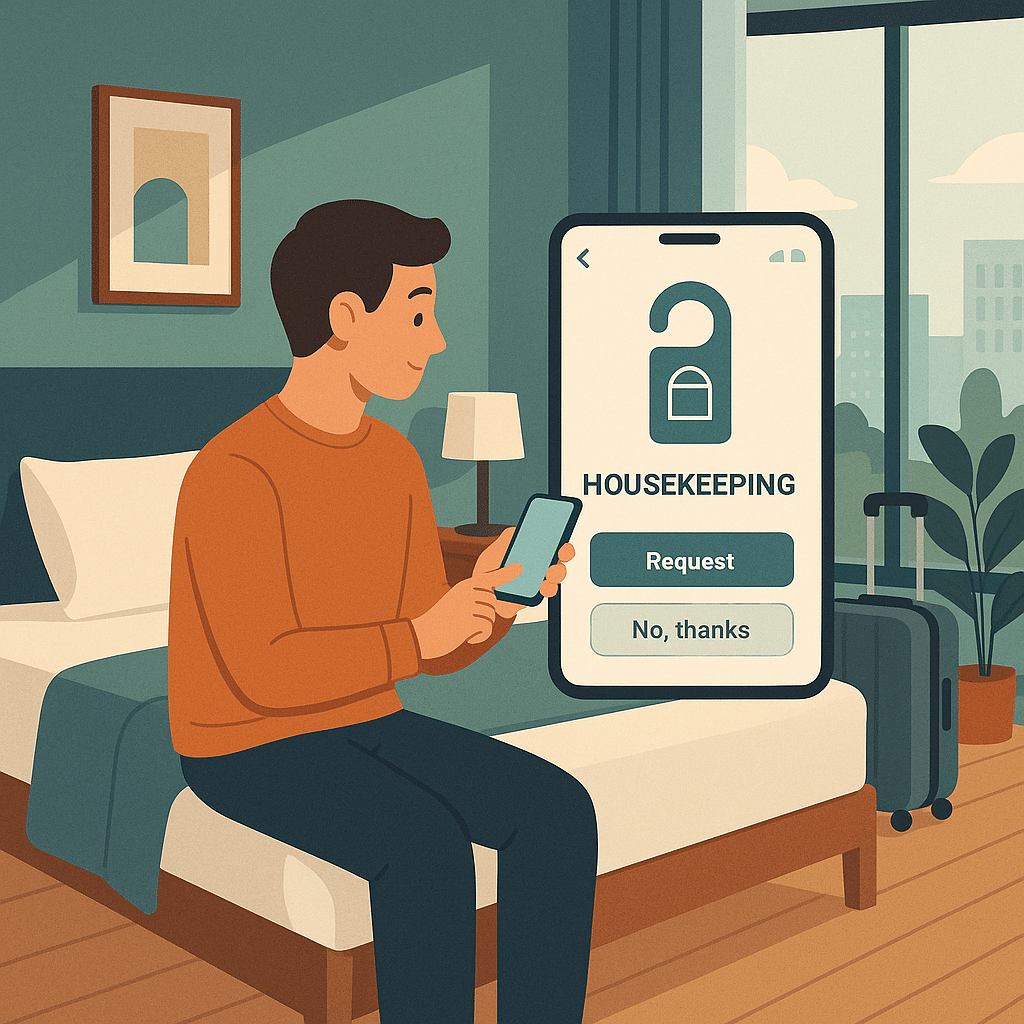Corporate Social Responsibility (CSR) is no longer an option for the hotel industry. It is a strong expectation from guests, a criterion for investors, and an imperative for the planet. But an effective CSR strategy goes far beyond a few symbolic initiatives. It can even include a transformation of operations, driven by data.
In this quest for a more sustainable model, one naturally thinks of classic actions such as the installation of solar panels, waste management, or the development of responsible purchasing. But what if we were missing a fundamental point? An often intangible aspect: it is the software ecosystem (CRM, PMS, Booking Engine…) that orchestrates, measures, and optimises all impact actions. Here’s how these technologies support each pillar of CSR with some concrete and measurable actions.

Environmental pillar: from waste reduction to “controlled sobriety”
This is the most visible aspect of CSR, where the gains offered by technology are the most spectacular.
The end of mass waste thanks to personalisation and anticipation
The aim is simple: consume only what is necessary. The CRM, by centralising customer knowledge, becomes the ultimate “anti-waste weapon”.
- Food: Food waste can represent a large part of a hotel’s environmental impact. According to WRAP, 75% of the food waste could have been consumed, representing a dead loss for the hotel. A CRM that knows guest’s habits (“never has breakfast,” “allergic,” nationality) allows for anticipating preferences and breakfasts in real-time. Demand becomes predictive, and surpluses, especially with food-buffet decrease.
- In-room resources: A guest could signal via the Guest App that they decline daily room service. This information, synchronised between the CRM and the PMS, automatically puts the room in “eco mode.” The gain is twofold: less cleaning products and a drastic reduction in water and energy consumption from laundry, which, according to ADEME, can account for 15% of a hotel’s water consumption.
BMS: When Software Becomes the Brain of the Building
Building Management System (BMS) is the system that controls the “metabolism” of the hotel: heating, ventilation, air conditioning (HVAC), lighting, hot water production. Formerly rigid and programmed on fixed schedules, BMS is becoming increasingly dynamic, powered by data from the software ecosystem.
From a logic of suffering resource use to a predictive logic.
- Before: Heating on floors turned on at a specific time, whether the hotel had 30% or 90% occupancy. Corridors remained lit all night.
- Now: The PMS knows the occupancy rate in real-time. It knows that the 3rd floor is empty tonight. It transmits the order to the BMS to put this floor in “unoccupied” mode (minimum temperature, lights off). The CRM can signal an arrival at 11 p.m. for room 201. The BMS will only trigger the heating for that room at 10:30 p.m.
The CRM and PMS no longer just manage reservations; they become the intelligent pilots of the physical infrastructure, transforming fixed costs into variable expenses and reducing the energy footprint.
Social and societal pillar: technology at the service of humanity
A CSR strategy cannot ignore its human impact. Here again, technology plays a facilitating role.
- Employee well-being: The automation of repetitive administrative tasks (check-ins, reporting, upsells…) via a high-performance PMS and CRM frees up valuable time for staff. They can then dedicate themselves to higher value-added missions: personalised welcome, advice, problem-solving. The result is reduced stress, greater job satisfaction, and better talent retention.
- A more inclusive customer experience: CSR also means accessibility and attention to everyone. A CRM makes it possible to take into account specific needs (guests with reduced mobility, strict dietary regimes, seniors…) even before the client’s arrival, ensuring a more comfortable and respectful stay for everyone.
- The end of paper and regained agility: Remember the thick “room directory,” that binder placed on the desk of each room. It contained restaurant opening hours, room service menu, spa treatments… The slightest change in schedule or price required reprinting hundreds of pages, a colossal waste of paper, ink, and time. Today, this binder is replaced by a simple QR code linking to the Guest App. The spa manager modifies a price? The information is updated instantly for all rooms, without printing. This is the end of wasted paper and outdated information, in favor of sustainable, up-to-date, and much more interactive communication for the guests.
Governance and management : measurement for better actions
A credible CSR strategy is based on a simple idea : you can only improve what you can measure. This is where the hospitality software ecosystem becomes an indispensable governance tool, not by generating ready-made CSR reports, but by providing the essential “raw material”: reliable data.
The software acts as the hotel’s dashboard, allowing the impact of each action to be quantified.
- Establish a Reference: Before launching a new initiative, the manager can extract reports from their hotel tools. “What is the average linen consumption per occupied room?” “What is the volume of housekeeping requests?”
- Measure the impact: The hotel launches an initiative via its Guest App to encourage guests to decline housekeeping in exchange of a free drink at the bar. A few months later, the manager can compare the data. They can precisely quantify the adoption rate of the offer and, consequently, estimate the savings in water, energy, and cleaning products.
This ability to objectify results makes it possible to compare the effectiveness of different practices, adjust strategy, and make informed decisions. It is this raw and verifiable data that will serve as the foundation for building transparent and quantifiable CSR communication, proving the validity of the commitments made.

The result : is digital a CSR ally or an enemy?
The question of the energy cost of digital technology is legitimate. The servers that host these solutions consume electricity. The The Shift Project group estimates that digital technology is responsible for approximately 3.5% of global greenhouse gas emissions.
However, it is necessary to compare orders of magnitude. The carbon impact of hosting a CRM in the cloud is marginal compared to the massive gains it allows in reducing the waste of physical resources (food, water, energy, paper…).
The answer is therefore a clear and resounding yes. The software ecosystem is the ally of the sustainable hotel. It offers the means to move from an ecology of intention to an ecology of precision.
In conclusion, CSR and technology are no longer two distinct subjects. For the visionary hotelier, investing in an integrated software ecosystem also means fostering a high-performing, transparent, and ultimately profitable CSR strategy. It is proof that the interests of the planet, its customers, its employees, and its financial balance sheet can be aligned.
